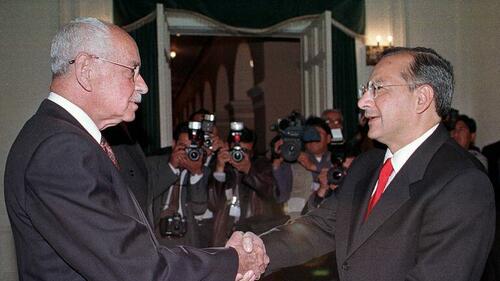Former US Ambassador Charged With Spying For Cuba For Over 40 Years
The Department of Justice (DOJ) has dropped a bombshell and almost unbelievable revelation, on Monday saying it has broken up a major Cuban spy operation that went on for decades at the highest levels of government.
Former US ambassador to Bolivia Manuel Rocha has been arrested at his Miami home for secretly acting as a spy for Cuba “for more than 40 years” in a development which may be without precedent. The case is being called the “highest-reaching and longest-lasting infiltrations of the US government by a foreign agent.”

73-year old Rocha spent his career rising through the ranks of the State Dept and foreign service, having began as a desk officer for Honduras all the way back in November 1981, after attending Yale, Harvard, and Georgetown University.
“For decades, Rocha allegedly worked as a covert agent for Cuba and abused his position of trust in the U.S. government to advance the interests of a foreign power,” a DOJ press release stated.
The US government said he secretly represented Cuban interests while in high ranking diplomatic positions, thus he had the ability to manipulate American foreign policy toward that end.
He was finally caught after such a long career serving dual purposes when he bragged to an undercover FBI agent that he had done “decades” of work on behalf of Cuba. The DOJ detailed this as follows in the wake of his being taken into custody last Friday:
The complaint alleges that, in a series of meetings during 2022 and 2023, with an undercover agent from the FBI posing as a covert Cuban General Directorate of Intelligence representative, Rocha made repeated statements admitting his “decades” of work for Cuba, spanning “40 years.”
When the undercover told Rocha he was “a covert representative here in Miami” whose mission was “to contact you, introduce myself as your new contact, and establish a new communication plan,” Rocha answered “Yes,” and proceeded to engage in a lengthy conversation during which he described and celebrated his activity as a Cuban intelligence agent.
The DOJ has sought to make clear these activities went far beyond some mere lobbying relationship, given that in the secretly recorded conversation with Rocha, the retired ambassador referenced the US as “the enemy”:
Throughout the meetings, Rocha behaved as a Cuban agent, consistently referring to the United States as “the enemy,” and using the term “we” to describe himself and Cuba. Rocha additionally praised Fidel Castro as the “Comandante,” and referred to his contacts in Cuban intelligence as his “Compañeros” (comrades) and to the Cuban intelligence services as the “Dirección.” Rocha described his work as a Cuban agent as “a grand slam.”
The case details also make clear that US authorities believe he was acting as an agent of Cuba from the very beginning of his service in the US State Dept in the early 1980s. If this is what Cuban intelligence could successfully do, what about Washington’s much bigger and powerful rivals?
A Cuban spy, Victor Rocha, was just caught after 40 years in the US Government.
He was an employee of the US State Department, served as a US Ambassador and even got on the National Security Council.
If Cuba has spies at this level for 40 years… imagine China, Russia and Iran. pic.twitter.com/E00expXAZl
— Geiger Capital (@Geiger_Capital) December 4, 2023
Rocha reached his high ranking diplomatic positions by the late 1980s, which included the following successive roles through the 1990s and early 2000s:
- First Secretary at the U.S. Embassy in Mexico City, Mexico;
- Deputy Chief of Mission at the U.S. Embassy in Santo Domingo, Dominican Republic;
- Department of State employee, as the Director of Inter-American Affairs on the U.S. National Security Council, with special responsibility for, among other things, Cuba;
- Deputy Principal Officer at the U.S. Interests Section in Havana, Cuba;
- Deputy Chief of Mission at the U.S. Embassy in Buenos Aires, Argentina; and
- November 1999 until in or around August 2002: Ambassador to Bolivia at the U.S. Embassy in La Paz, Bolivia.
It has not been revealed the precise ways or moments in which he benefitted Cuba or potentially influenced US policy. Interestingly, he was posted in Cuba at various times in which Washington did not have official relations with the Castro government, which has also long been under crippling sanctions.
One key question that will naturally arise: given the length and span of his being a Cuban spy at top echelons of the State Department, are there more foreign moles? It seems this is the likely scenario, especially given this period reaching back into the 1980s marked the tail end of the Cold War.
Tyler Durden
Mon, 12/04/2023 – 20:40
via ZeroHedge News https://ift.tt/tkSTnIQ Tyler Durden